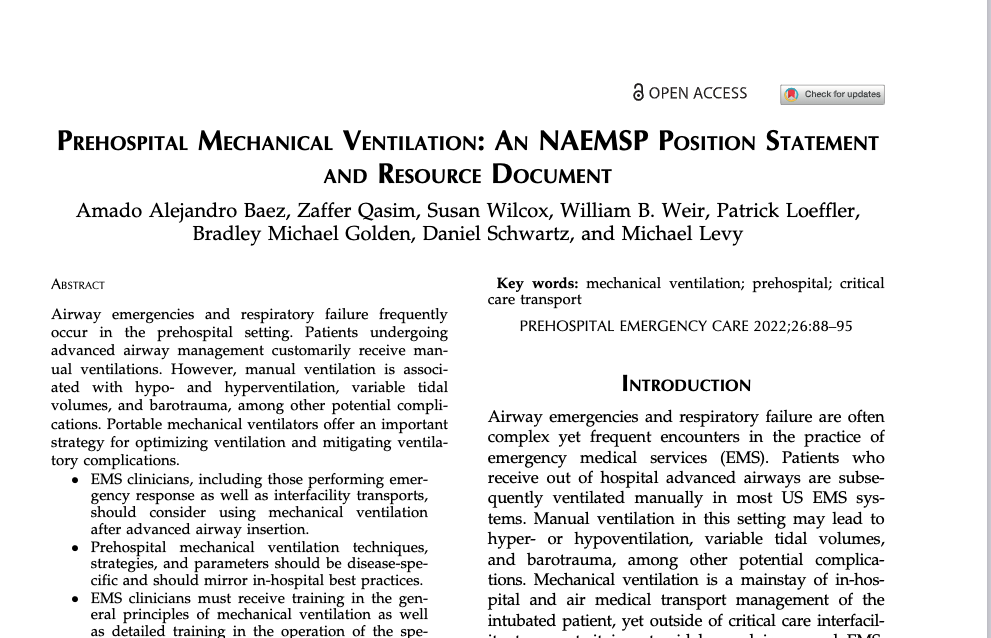
Prehospital Ventilator Life Support (PHVLS)
A Mechanical Ventilation Mastery Workshop for Prehospital and Critical Care Transport Providers
An immersive learning experience on the art and science of mechanical ventilation unlike anything you’ve experienced before.
The Definitive Course for Mechanical Ventilation Training for EMS and Transport Professionals
Training designed to meet the unique challenges of mechanical ventilation care in the out-of-hospital environment.
Workshop Includes
Full day of LIVE hands-on interactive training including
Minimal lectures. I belive the most effective learning happens when we’re engaged. That’s why all our lessons are hands-on and interactive.
Concepts are reinforced through our practical scenarios, which are designed to challenge the learner to think critically, problem-solve, and apply what they’ve learned.
Workshop is tailored to your specific equipment and protocols.
8 hours of continuing education credit
Upon successful completion of the workshop, students will receive a certification card good for 3 years.
Workshop Requirements
Must hold a current A-EMT, Paramedic, RT, or RN license.
Physicians are also welcome to attend.
* Students must attend the entire workshop to receive credit. Partial credit will not be awarded.
Continuing Education Hours
RN hours awarded through the California Board of Nursing
EMS Hours awarded through our partnership with First Response Team Training, a Colorado approved EMS Training Group
Course covers…
Basic principles and importance of early effective mechanical ventilation
Equipment and Logistical Challenges in the out-of-hospital environment
Critical A&P Review
Essential Gas Law and Their Application
Effective Delivery of Non-Invasive Ventilation (HFNC / CPAP / BPAP)
Managing ETT / Surgical Airways / Supraglottic Devices
Breath Types, Vent Settings, Alarms, Triggers, and Limits, including
Pressure Control vs. Volume Control
Tidal Volume, Respiratory Rate, PEEP, FiO2, Flow, and Driving Pressure,
Basic and Advanced Modes available on transport ventilators, including
Pressure Support, CMV, Assist Control, SIMV, PRVC, IRV, APRV, ASV
Basic and Advanced Patient Monitoring and Troubleshooting, including
Blood Gasses, SpO2, EtCO2, and Volumetric Capnography
Loops and Pressure / Flow / Volume Waveforms
Lung Point-of-Care-Ultrasound
Patient Management in the out-of-hospital environment
Cardiac Arrest
Trauma / Burns / Drowning
Severe Obstructive and Restrictive Physiology
Static and Dynamic Compliance
Time Constants
Special Population
Chronic vented patients
Pediatric, Geriatric, Obstetrics
Prehospital Mechanical Ventilation is Supported by both the National Association for EMS Physicians (NAEMSP) and the American Association for Respiratory Care (AARC)
National Association for EMS Physicians Position Statement on Prehospital Mechanical Ventilation
NAEMSP recommends the use of invasive mechanical ventilation for hypoxic respiratory failure, hypercapnic respiratory failure, and airway protection. These may be on initial contact from an emergency ground ambulance response, or during interfacility transfers via critical care teams.
EMS Clinicians must Receive Training in the General Principles of Mechanical Ventilation as Well as Detailed Training in the Operation of the Specific System(s) used by the EMS Agency.
American Association for Respiratory Care Position Statement on Pre-Hospital Ventilator Management
It is the position of the American Association for Respiratory Care (AARC) that all persons involved in the setup, initiation, application, and maintenance of mechanical ventilators in the pre-hospital setting be formally trained in both the clinical and disease-specific applications of mechanical ventilation.
The AARC recommends that all pre-hospital providers of mechanical ventilation be required to demonstrate competence, at regular intervals, in the use and manipulation of all mechanical ventilators used during the transport of sick and injured patients.
Registration Fee: $325 per student*
Includes all travel expenses
Minimum Class Size = 12
Maximum class size depends on the number of available ventilators
*Fees for classes held outside the continental US may be different





